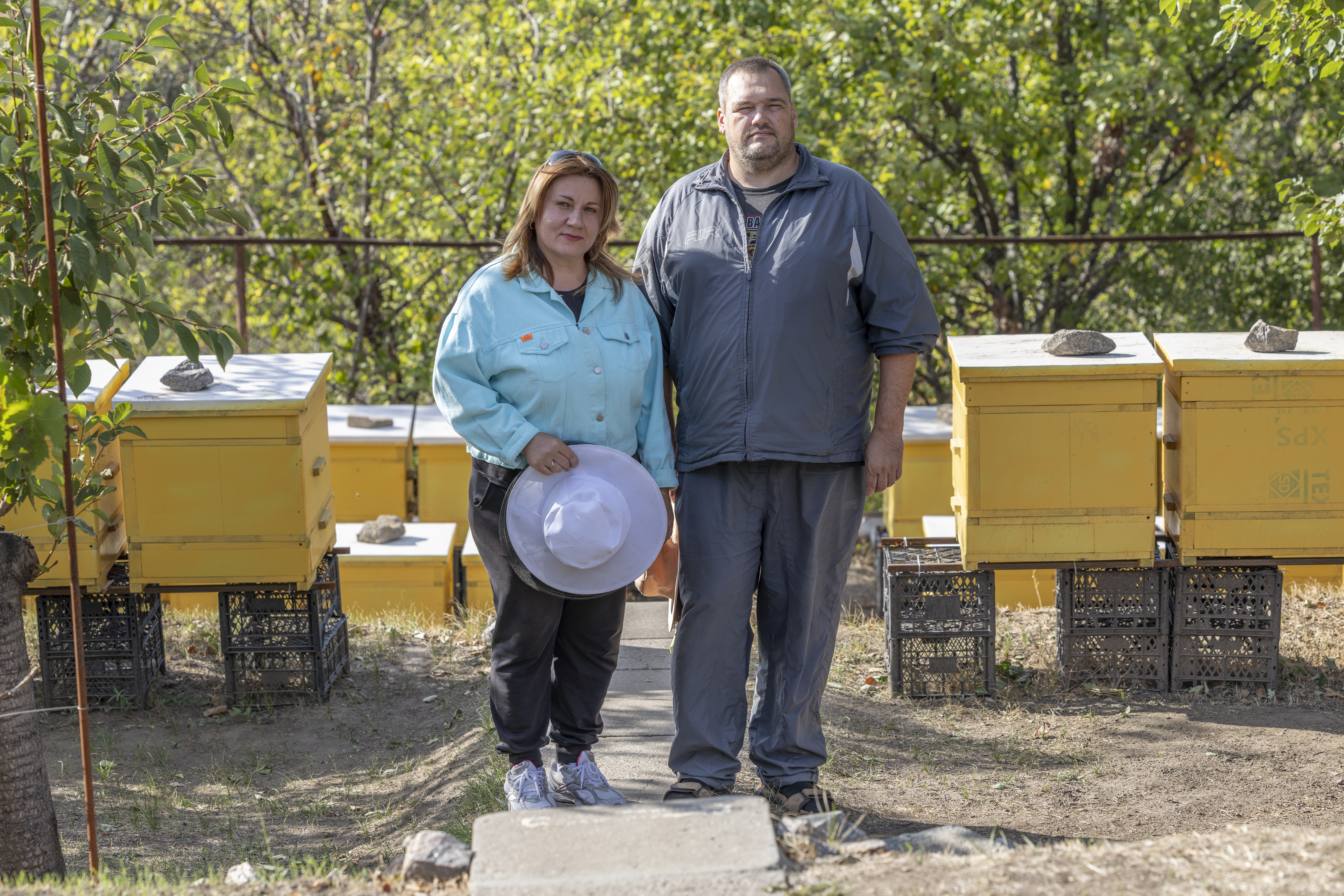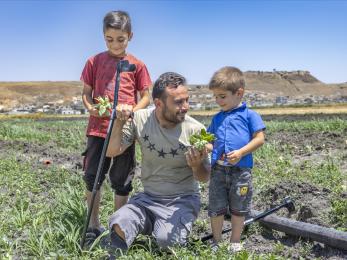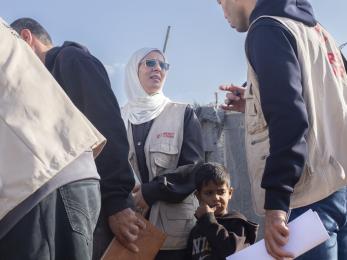Q&A: How bread is helping families survive in Syria
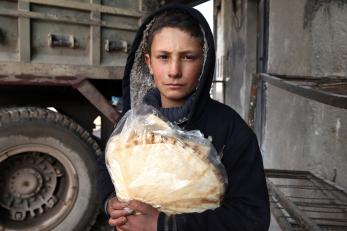
The constant bombing and shelling around their home in Aleppo city, the epicentre of Syria’s years-long civil war, was suddenly too much. Fearing for his family’s survival, Amir* grabbed his wife and seven children, and fled with them to the nearby countryside.
There, a local village took them in and helped them find a shelter. But Amir didn’t stop worrying.
Goods and services are both expensive and hard to come by in many war-battered areas in Syria. And Amir had just left what remained of his community and livelihood behind. How would he feed his family?
Amir found a temporary job working for a very low wage in effort to support his wife and children, but he could never provide his family with enough food or bread, a staple of the Syrian diet. They consumed three bags of bread a day before being displaced by the war. With the little money he was making in their new home, Amir couldn’t afford to even buy one.
“When we had no food to eat, we sent our children to borrow from neighbours,” Amir’s wife says.
“Or sometimes, we ate less so that our children could eat,” Amir adds.
That was before Mercy Corps started supplying his family with bread. As one of the largest non-governmental organisations working inside Syria, we help feed hundreds of thousands of people each month by supplying local bakeries with flour to bake bread and ensuring the most vulnerable people have access to it.
This assistance often provides a lifeline for desperate families: With the bread needs of his family covered, Amir can put his earnings toward other things, like formula for his youngest child.
“Now I do not worry too much about how or from where to secure bread,” he says. “I know that sometimes it is even difficult to find bread to buy due to shortages in the town, but now I receive bread near to my house.”
Learn more about how this program works and the impact it’s having on families caught in war through the Q&A with our Syria team members below.
Why bread?
One of the Arabic words for bread is “Aysh,” which is also the word for life.
Bread has always been a critical staple of the Syrian diet. Before the conflict, it was inexpensive and eaten with nearly every meal. Now, during this very tiring and traumatic time, access to bread helps provide many Syrian families with a sense of normalcy and stability.
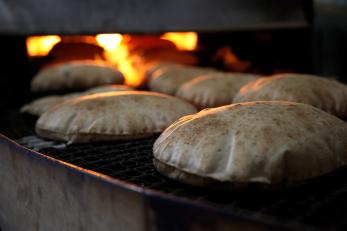
It’s even become increasingly important to their well-being: Syrian families not receiving other food assistance reportedly get 40 per cent of their calories from wheat, mainly bread. And, when paired with complementary items, like tomato paste, it provides a nutritionally-dense meal.
How does the bread program work?
The bread program works in two ways to ensure that vulnerable, food-insecure families in Aleppo Governorate have access to this very important food.
The first part of the program provides flour to local bakeries to help them offset the rising cost of wheat inside Syria. We provide the flour through a contract that guarantees the price of bread for families in the area remains fixed and affordable.
Providing the flour directly to bakeries, instead of families, helps bolster the local economy. It also helps more people benefit from the program, because the burden of producing bread in their own homes would require electricity, gas, fuel, ingredients and other supplies many may not have access to.
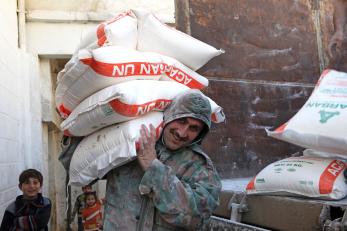
Between March and September of 2016, we delivered over 5,000 metric tonnes of flour to 18 bakeries inside northern Syria. We continue to provide, on average, 660 metric tons per month, which supports an estimated 131,500 people.
Secondly, for vulnerable families like Amir’s, who can’t afford to purchase bread even at a low cost, we are implementing a voucher program so they can get it for free.
These families will receive a certain number of vouchers based on their level of need, which includes family size, which they can trade for bread when and where they need it most.
Why can’t people buy the food they need?
Conflict decreases access to and availability of goods within local markets. In many violence-ridden areas in Syria, the movement of supplies and people is heavily restricted. That means vital goods, like food and medicine, can’t safely get in, and people can’t safely get out.
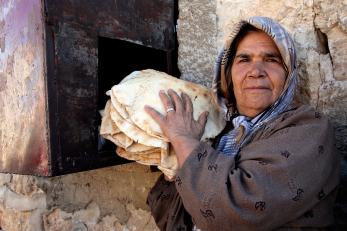
The limited food that is available is too expensive for many vulnerable families to purchase. Around 30 per cent of people we recently interviewed stated they are forced to borrow food or buy it on credit, which pushes them into debt.
Additionally, many families have been displaced by violence more than once. Displacement limits people’s ability to earn an education, learn new skills or maintain livelihoods, both because these opportunities are scarce and because sheer survival — finding shelter, food and water — becomes the priority.
That’s why we contract the bakeries we work with to price bread at an affordable rate, so families can allocate the money they do have to savings, household improvements, fuel, medicine and education.
The conflict has also devastated farmers. Aleppo Governorate is a fertile area that was once home to many agricultural livelihoods, including wheat farming, livestock herding and production of bread and dairy products. But in the past five-plus years of conflict, the price of many critical goods, like the seeds and tools required for farmers to maintain their livelihoods, has increased along with food costs.
Without these supplies, farmers are no longer able to produce food for their families or communities.
How are people getting the food they do have?
Unfortunately, those who may have had assets before the conflict, like savings or livestock, have been forced to trade them for food.
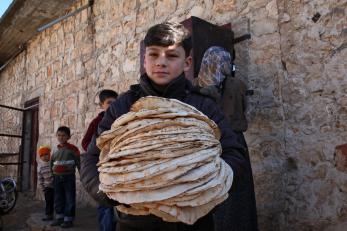
In northern Syria, most families now rely on the generosity of other family and community members, humanitarian assistance or the small amounts of income they are able to generate, if they are able to generate anything at all.
The situation is also dire in other areas of the country. In 2014, residents of Yarmouk camp, in the city of Damascus, broke into a spice factory and boiled weeds, spices and water into a broth they survived on for months. We’ve also heard reports of people mixing glue from their shoes with flour to make crude, dark bread.
Mercy Corps is currently the largest provider of food aid in north Syria, outside of the United Nations. Many of the families we are helping tell us they have run out of money and we are now their only source of food.
What else can we do?
In some of the same hard-hit areas where we operate the bread program, we are expanding livelihood support to help families meet their basic needs and decrease their reliance on aid.
Where possible, we plan to help people learn gardening skills so they can grow vegetables to feed their families and sell in local markets for income. We will also provide farmers with the supplies they need to restart or maintain their livelihoods.
Additionally, we deliver blankets, household items and other critical supplies to help those caught in the crossfire survive.
What is it like working on the ground in Syria?
After more than five years, fighting on the ground and bombings from the air continue, with devastating effects on civilians and aid operations.
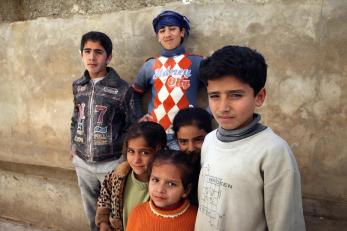
According to the United Nations, 13.5 million people inside Syria are in urgent need of humanitarian assistance, and half a million people are living under siege, their access to necessities like food and medicine left to the whims of warring parties.
The country is an active war zone, and humanitarian principles are not respected within its borders. Yet, our team members continue to operate, even at great personal risk.
They come from the communities they serve, and they feel a deep sense of commitment to our programming. They know families often rely on Mercy Corps to feed their families.
Our team members in Syria are incredibly brave, resilient and dedicated. And, despite the dangers, they stand ready to assist those in need for as long as it takes.
